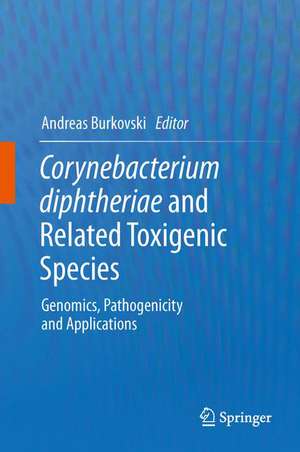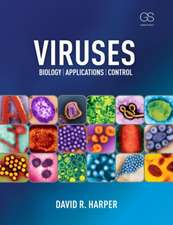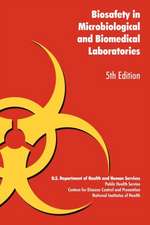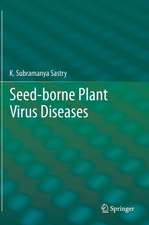Corynebacterium diphtheriae and Related Toxigenic Species: Genomics, Pathogenicity and Applications
Editat de Andreas Burkovskien Limba Engleză Hardback – 18 noi 2013
| Toate formatele și edițiile | Preț | Express |
|---|---|---|
| Paperback (1) | 1095.16 lei 43-57 zile | |
| SPRINGER NETHERLANDS – 23 aug 2016 | 1095.16 lei 43-57 zile | |
| Hardback (1) | 1102.10 lei 43-57 zile | |
| SPRINGER NETHERLANDS – 18 noi 2013 | 1102.10 lei 43-57 zile |
Preț: 1102.10 lei
Preț vechi: 1160.10 lei
-5% Nou
Puncte Express: 1653
Preț estimativ în valută:
210.95€ • 229.22$ • 177.32£
210.95€ • 229.22$ • 177.32£
Carte tipărită la comandă
Livrare economică 21 aprilie-05 mai
Preluare comenzi: 021 569.72.76
Specificații
ISBN-13: 9789400776234
ISBN-10: 9400776233
Pagini: 400
Ilustrații: XVII, 293 p. 22 illus., 8 illus. in color.
Dimensiuni: 155 x 235 x 20 mm
Greutate: 0.61 kg
Ediția:2014
Editura: SPRINGER NETHERLANDS
Colecția Springer
Locul publicării:Dordrecht, Netherlands
ISBN-10: 9400776233
Pagini: 400
Ilustrații: XVII, 293 p. 22 illus., 8 illus. in color.
Dimensiuni: 155 x 235 x 20 mm
Greutate: 0.61 kg
Ediția:2014
Editura: SPRINGER NETHERLANDS
Colecția Springer
Locul publicării:Dordrecht, Netherlands
Public țintă
ResearchCuprins
Diphtheria and Its Etiological Agents.- Corynebacterium diphtheriae, Corynebacterium ulcerans and Corynebacterium pseudotuberculosis - General Aspects.- Comparative Genomics and Pathogenicity Islands of Corynebacterium diphtheriae, Corynebacterium ulcerans and Corynebacterium pseudotuberculosis.- Corynephages: Infections of the Infectors.- Toxin Structure, Delivery and Action.- Iron Acquisition and Iron-Dependent Gene expression in Corynebacterium diphtheria.- Assembly and Function of Corynebacterium diphtheria.- Toxigenic Corynebacteria: Adhesion, Invasion and Host Response.- Detection Methods for Laboratory Diagnosis of Diphtheria.- Diphtheria Surveillance.- History of diphtheria Vaccine Development.- Antimicrobial Susceptibility and Treatment.- Sialidases of Corynebacteria and Their Biotechnological Application.- Molecular Genetic Tools for Research in Corynebacterium diphtheria.- Diphtheria Toxin Based Molecules as Therapeutic Approaches.
Recenzii
From the book reviews:
“It extensively examines the genomics, pathogenicity, diagnosis, and treatment of these bacteria as well as vaccine development. … an excellent resource for graduate, postdoctoral fellows, and basic scientists in microbiology, molecular genetics, or public health. It also would be a useful introductory tool for infectious disease fellows who are interested in pursuing public health and/or basic science research as part of a physician/scientist training pathway.” (Shirley F. Delair, Doody’s Book Reviews, August, 2014)
“It extensively examines the genomics, pathogenicity, diagnosis, and treatment of these bacteria as well as vaccine development. … an excellent resource for graduate, postdoctoral fellows, and basic scientists in microbiology, molecular genetics, or public health. It also would be a useful introductory tool for infectious disease fellows who are interested in pursuing public health and/or basic science research as part of a physician/scientist training pathway.” (Shirley F. Delair, Doody’s Book Reviews, August, 2014)
Textul de pe ultima copertă
Corynebacterium diphtheriae is the classical etiological agent of diphtheria and the type strain of the genus Corynebacterium. While diphtheria of the respiratory tract became rare with the introduction of vaccination programs in industrialized countries, even today several thousand cases per year are reported to the World Health Organization. This shows that diphtheria is not completely eradicated and that reservoirs exist. The book summarizes the latest advances made in understanding C. diphtheriae and the closely related species Corynebacterium ulcerans and Corynebacterium pseudotuberculosis. Topics addressed are genomics of toxigenic corynebacteria, host-pathogen-interaction, detection, surveillance and treatment as well as application aspects.
Caracteristici
Several Corynebacterium glutamicum books have been published, but little to nothing about C. diphtheriae A considerable number of research groups work on pili, surface structures, vaccines, distribution, host-pathogen-interactions, Fe metabolism, biotechnological applications (vectors systems to induce cell death, sialidase) Recently published genome sequences give the unique opportunity to compare C. diphtheriae genomes Includes supplementary material: sn.pub/extras





